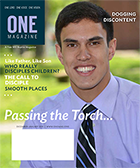
December-
January 2015
Passing the Torch
------------------
|

A New Way to Save for Retirement: Roth 403(B) Contributions
By D. Ray Lewis
Beginning in 2015, the Board of Retirement will offer a new retirement savings option to participants in the Free Will Baptist Retirement Savings Plan. For the first time, participants will have the option of making Roth 403(b) contributions into the Plan. Modeled after the Roth IRA, the new option allows employees a second way to make after-tax contributions.
How does the Roth 403(b) work?
Contributions to your Roth account are deducted from your salary just like salary reduction contributions and are sent to your account by your employer. These contributions are made with after-tax dollars and do not reduce your current taxable income. They are subject to federal, state and Social Security tax before they are invested in the Plan.
How is this different from after-tax contributions available in the past?
Both Roth and traditional after-tax contributions are similar in tax treatment before retirement. Both types of contributions are considered taxable income the year they are contributed to the Plan. The earnings accumulate differently, however. Earnings on the traditional after-tax contributions accumulate tax-deferred while the earnings on the Roth contributions accumulate tax-free.
The big difference is not realized until the funds are withdrawn. Roth funds, the money you have accumulated through the Plan, will be completely yours when withdrawn, as long as those withdrawals meet the Qualified Distribution rules explained below.
Withdrawals of traditional after-tax contributions will have taxes due on the accumulated earnings only. Since you have already paid taxes on the funds you contributed to your account, no taxes are due on the contributions when withdrawn. Taxes are only due on the accumulated earnings.
Who should consider Roth Contributions?
If you anticipate being in a higher tax bracket in retirement than you are now, you may want to consider a Roth account. Also, if your present income is more than what the income limits allow for contributing to a Roth IRA, you may want to consider a Roth 403(b) account with the Board of Retirement, because there are no income limits for making Roth contributions to the Plan.
How much can I contribute?
At the time of this writing, the 2015 contribution limits were not available. In 2014, participants can potentially contribute up to $26,000.
That figure is based on three factors:
-
$17,500, plus
-
$5,500 if you are at least 50 years old, plus
-
$3,000 if you have been employed by Free Will Baptists for a minimum of 15 years.
It is important to note this limit is a combined limit that includes any pre-tax salary reduction contributions as well as any Roth contributions. In other words, your salary reduction contributions and your Roth contributions combined cannot exceed the above contribution limits.
Can my employer match my Roth contributions?
Yes. But keep in mind that employer contributions are made on a pre-tax basis. Therefore, you will owe income taxes on the employer matching contributions as well as any accumulated earnings on those funds when you withdraw them.
What are the Qualified Distribution Rules?
Withdrawals from a Roth 403(b) account are tax-free for federal income tax purposes (state tax rules vary) provided they are Qualified Distributions. A Qualified Distribution must meet the following criteria:
-
Funds must be held for at least five years. The five-year period is determined by the earlier of: 1) the first year you contribute to your Roth 403(b) account with the Board of Retirement, or 2) if you make a rollover contribution to your Roth 403(b) account, the first year you made a Roth contribution to the Plan from which the rollover originated. And …
-
The distribution must be made after you:
-
have reached age 59½
-
are permanently disabled, or
-
made to your beneficiary or beneficiaries after your death.
Withdrawals that do not meet these conditions are considered non-qualified withdrawals, and the portion of the distribution that represents earnings will be subject to ordinary income tax and possibly a 10% federal penalty for early withdrawal.
Can I roll funds in my present Plan over to my Roth 403(b) account?
Yes. The Plan allows you to make an in-plan direct Roth rollover by transferring certain non-Roth funds that you have contributed to the Plan into a Roth account in the Plan. This is known as an “in-plan rollover” or “in-plan conversion.” Contact our office for regulations on rolling over your current funds into the Roth.
Even though you might choose to make both types of after-tax contributions (traditional and Roth), you will have only one account with the Board of Retirement. In other words, you don’t have to make separate investment decisions for your traditional and Roth contributions. Instead, your investment elections will be applied to both. Roth contributions, like all other types of contributions, can be made into any one or more of our four investment options: conservative, moderate, default, or maximum.
We are pleased to offer this new type of investment option. If you would like more information on Roth accounts simply call our office for more details. We are here to serve you and count it a privilege to help you prepare for your retirement years.
About the Writer: D. Ray Lewis has been director of Board of Retirement since 2005. To learn more about retirement options, visit
www.boardofretirement.com.
|
|

